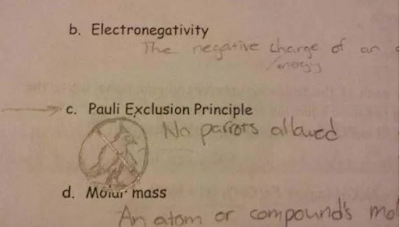Students' Answers on Tests That Are Supposed to Be Funny
Everyone has some sense of humor including me and I do find some posts on the web that share student's unusual answers to test questions rib-tickling. One site actually has a collection of such posts, "Hilarious Test Answers from Kids" by Robert Wabash, which even ranks the answers by readers' votes. One case comes from either a physics or chemistry exam.
If you were the one teaching these topics, the above maybe distressing if this comes from one of the students in your class. But if this student is not in your class, you have to agree that this is quite funny. This is why these posts generally turn out to be quite viral in social media.
Recently, there is one that has become viral on social media in the Philippines. It is from Lola Nidora, a character in the noontime soap opera Kalyesere.
The above test question is asking the student to illustrate through a sketch how someone can become a hero. The student is then asked to summarize in a couple of sentences what his or her drawing is saying. The exercise looks like it is supposed to be given to kindergarten pupils. However, from the handwriting and the drawing, the answer does not really look like it comes from a 5-year old. The recognition alone that there are two steps and the dynamic nature of the illustration, not to mention the quality of the drawing, do make it highly doubtful that this is a work of a kindergarten pupil. This becomes even more evident when one puts the artistic talent side by side with the content. The student fills in the blanks to complete the sentences, "I am Bayani Agbayani. I will try to become a hero. I will do the "ocho-ocho". "Ocho-ocho" is a song and dance popularized by an artist named Bayani Agbayani. It does strike some similarity with the "Pauli" example shown previously since Pauli has also been confused with the name of a parrot. However, in this case, "bayani", which means hero, is not capitalized and is a real common word in Filipino, unlike Pauli which is a proper noun.
Some things are indeed funny while some are in fact very disconcerting. Whether these posts are genuinely made by children or not is one question. But whether we find them funny or not is a much more serious question. Elections are less than a year away in the Philippines. As individuals file their candidacy, I likewise find cases where I am asking myself if I should be laughing or crying.
 |
| Above copied from Hilarious Test Answers from Kids |
If you were the one teaching these topics, the above maybe distressing if this comes from one of the students in your class. But if this student is not in your class, you have to agree that this is quite funny. This is why these posts generally turn out to be quite viral in social media.
Recently, there is one that has become viral on social media in the Philippines. It is from Lola Nidora, a character in the noontime soap opera Kalyesere.
 |
| Above copied from Lola Nidora |
The above test question is asking the student to illustrate through a sketch how someone can become a hero. The student is then asked to summarize in a couple of sentences what his or her drawing is saying. The exercise looks like it is supposed to be given to kindergarten pupils. However, from the handwriting and the drawing, the answer does not really look like it comes from a 5-year old. The recognition alone that there are two steps and the dynamic nature of the illustration, not to mention the quality of the drawing, do make it highly doubtful that this is a work of a kindergarten pupil. This becomes even more evident when one puts the artistic talent side by side with the content. The student fills in the blanks to complete the sentences, "I am Bayani Agbayani. I will try to become a hero. I will do the "ocho-ocho". "Ocho-ocho" is a song and dance popularized by an artist named Bayani Agbayani. It does strike some similarity with the "Pauli" example shown previously since Pauli has also been confused with the name of a parrot. However, in this case, "bayani", which means hero, is not capitalized and is a real common word in Filipino, unlike Pauli which is a proper noun.
Some things are indeed funny while some are in fact very disconcerting. Whether these posts are genuinely made by children or not is one question. But whether we find them funny or not is a much more serious question. Elections are less than a year away in the Philippines. As individuals file their candidacy, I likewise find cases where I am asking myself if I should be laughing or crying.
Comments
Post a Comment